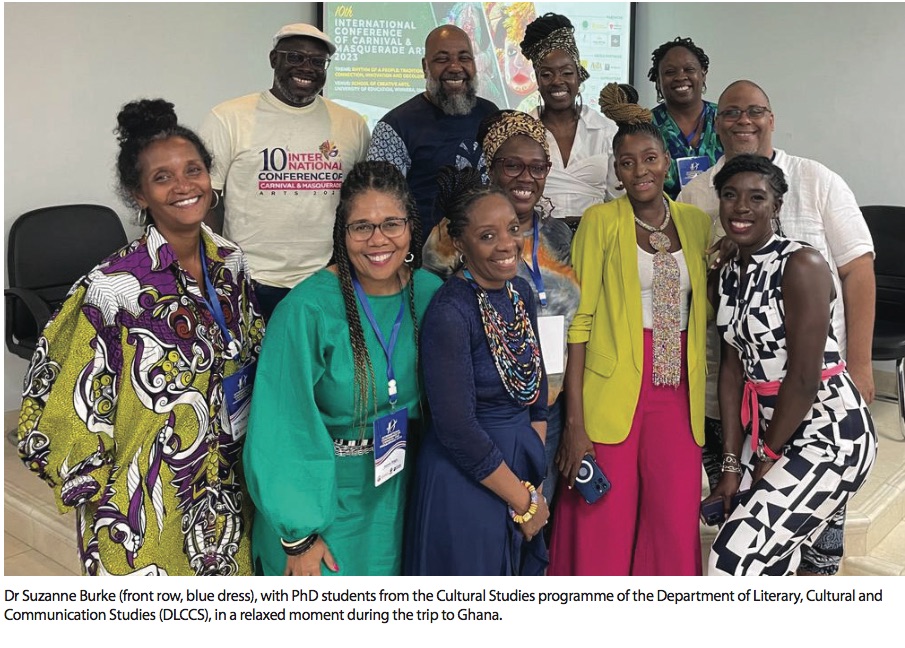
“For many of us, the Carnival’s journey to rekindle part of its roots through this conference is both noteworthy and necessary, simply because so many elements of the carnival arts that we practise today find their origins here. Of equal importance is the route it has taken us to get here.”
These were the words of Dr Suzanne Burke, Head of the Department of Literary, Cultural and Communication Studies (DLCCS) at UWI St Augustine, as she delivered her keynote speech to the 10th International Conference on Carnival and Masquerade Arts in Winneba, Ghana.
The conference, titled “Rhythm of a People: Tradition, Connection, Innovation and Decolonisation” was held from December 4 to 9, 2023 at the University of Education, and hosted Dr Burke and ten PhD students from the Cultural Studies programme whose research was related to the themes of Carnival, masquerade arts, performativity, and resistance.
Delivering her keynote speech, “Spirits Rise: The Significant Power of the Carnival Arts as Portals for Transilience”, Dr Burke showcased the power of Carnival to act as a portal through which we can enact radical change, incorporate sacred rituals (such as J’ouvert), provide space for liberation, and release societal tensions.
Emphasising the dynamic structure of Carnival that includes the economy, state, and people, Dr Burke’s address dealt primarily with how Carnival and masquerade art can be used as an anti-colonial praxis that seeks to decentre empire and act as a transformative force.
Delving into how Caribbean-styled Carnivals have distinctive forms of artistic expression that utilises music, masking, mimicry, and movement to identify and unsettle societal injustice, she posits, “It connects us to each other. We in the Caribbean have all come from somewhere else, and the conference being held in Ghana recognises just one of the roots of Carnival. By going back to Africa, there is an acknowledgement that it is something that we carried and are bringing back.”
After attending the conference, Dr Burke recognised that many on the African continent are particularly interested in Carnival as a mechanism for peace and social justice, underscoring how the festival itself can be used as a portal for connection across the seas.
“When I talk about the Carnival and masquerade arts as portals for change, it is not just in the messages that the masquerade can give, or the music can give, but also for us to feel somatically, inside of our DNA – a connection to our roots and to each other – and these are the things that allow us to know what we know in different ways,” she said.
On the second day of the conference (December 5), Dr Burke presented a conference paper, “‘Town will need a renovation’ – The Performative Affect of Super Blue’s Music (1980-1995)” which discussed how Super Blue’s music and live performances were also insightful tools to theorise about society, identity, and creating change.
“When you have a piece of art, it brings you inside of the conversation, and you know that fact in a different way,” she explained. “That can effect change in the way you deal with yourself, you understand yourself, and how you deal with communities and people around you.”
Alongside Dr Burke, the ten PhD students that attended the conference also presented papers, which were all well received. The trip was wrapped up by touring places of interest such as the Kwane Nkrumah Memorial, the slave dungeons at the Gold Coast and Elmina, as well as the hospitality centre at Elmina where the group were hosted by Queen Gwira Akyinim, Elmina, Nana Tseasewaa III.